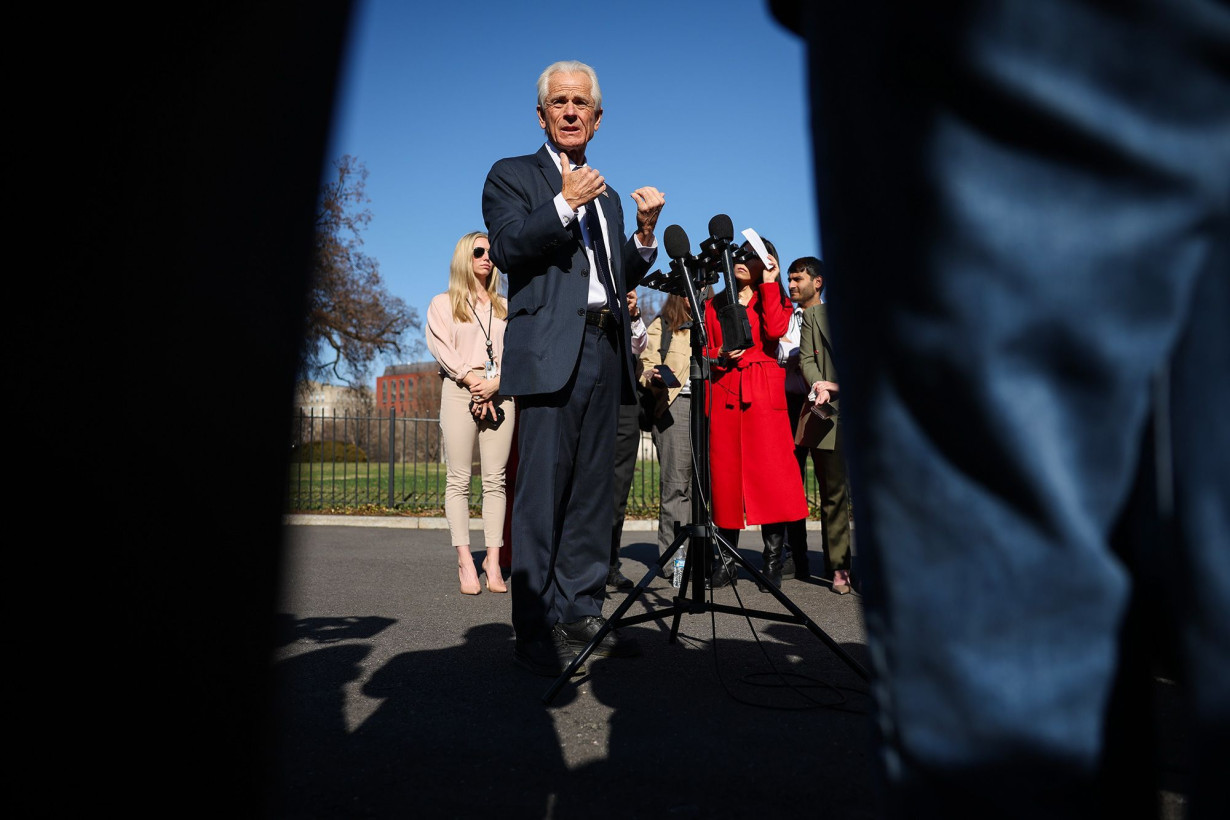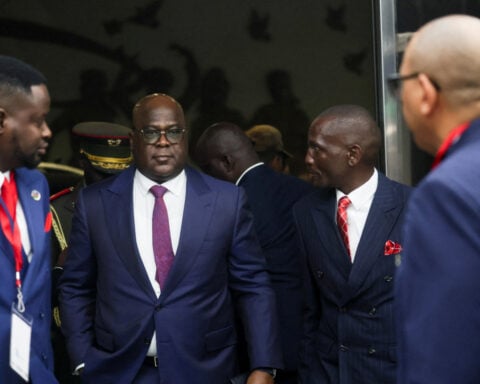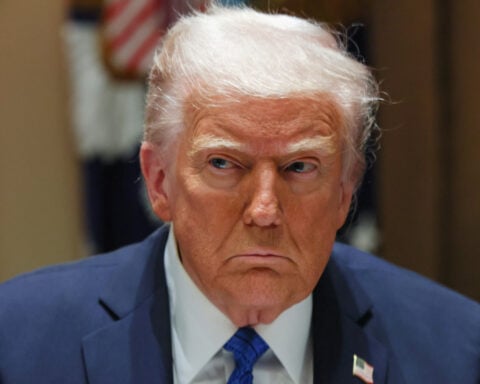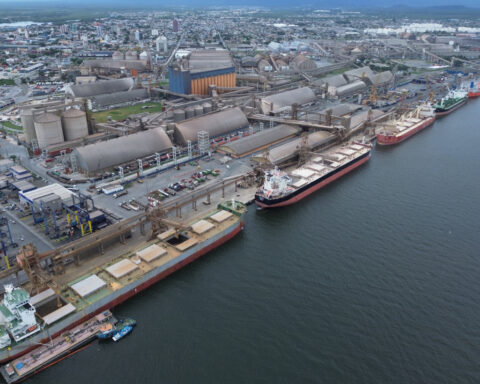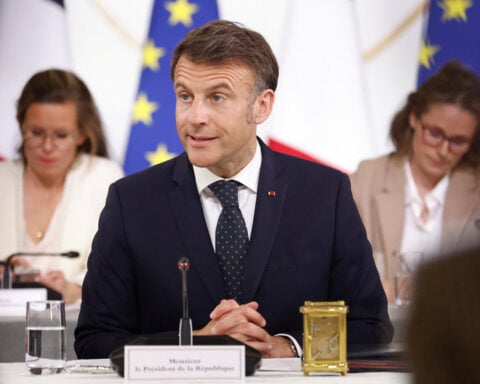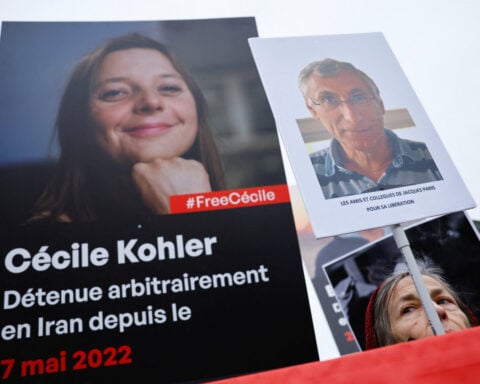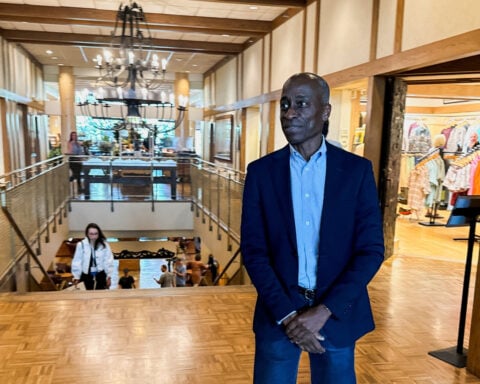(CNN) — White House aide Peter Navarro said Sunday that he expects President Donald Trump’s tariffs to bring in $6 trillion in revenue in the next decade, which could amount to the largest tax hike in US history.
Even when adjusting for inflation, that amount would be triple the tax increase put in place in 1942 to pay the cost of fighting World War II.
Navarro, Trump’s senior counselor for trade and manufacturing, insists it’s not a tax increase but a tax cut — echoing the Trump administration’s repeated belief that tariffs will be paid not by American consumers but by businesses in other countries or the countries themselves.
“The message is that tariffs are tax cuts, tariffs are jobs, tariffs are national security,” Navarro said on Fox News Sunday. “Tariffs are great for America. They will make America great again.”
But most economists say US-imposed tariffs are paid by American businesses and consumers in the form of higher prices on imported goods, not paid by foreigners.
Trump plans to announce additional tariffs on Wednesday, which he has dubbed “Liberation Day,” on all manner of imported goods as retaliation for what he sees as unfair barriers to US exports to other countries. Trump has already announced tariffs on all goods from China, Mexico and Canada, and this week a 25% tariff on all imported cars is set to take effect.
Navarro said the tariffs will set the stage for tax cuts to be passed by Congress later this year, But the tariff revenue figures that Navarro quoted would be a huge tax increase for Americans in the short term, if they happen.
The non-auto tariffs alone “are going to raise about $600 billion (a year), about $6 trillion over a 10-year period,” Navarro said. Cars, he said, would add another $100 billion annually.
It’s not clear how Navarro calculated this $700 billion annual figure, since the details of these tariffs have yet to be fully disclosed. It’s also not clear, and perhaps unlikely, that Americans will continue to buy as many imported goods if prices are hiked due to the cost of the tariffs.
To reach Navarro’s estimate, it would take a 25% tariff on virtually all $3.3 trillion in goods imported by US businesses and consumers in 2024. And that’s not going to happen.
Canadian energy imports will be hit with a 10% tariff, not 25%, and Canada is the largest source of the nation’s petroleum imports. Chinese goods mostly will have a 20% tariff. In addition, Trump has said not all goods would be hit by tariffs — only goods from countries that have what the administration considers to have “unfair” trade policies towards the United States.
What’s more, Trump’s on-again-off-again approach to tariffs so far means the effective rate may not be able to bring in $700 billion regardless. Timeframes for levying them may be delayed, and some countries may reach deals with the Trump administration to eliminate tariffs, for example.
Plus, the $6 trillion figure implies that Americans wouldn’t change their purchasing behavior. That’s exactly what the tariffs are intended to do: Get consumers to buy American (and get foreign and multinational businesses to shift production to new US factories).
So at this stage, it’s simply not possible to know exactly how much revenue America will bring in from tariffs.
But even if Navarro’s proposed figure is hugely inflated, the cost of tariffs on a dollar basis is still likely to represent a huge tax increase unlike anything seen in US history.
Navarro’s predictions in context
On a percentage basis, the 1942 tax bill that raised money to fight World War II is the largest tax increase in US history, according to a 2006 analysis by the Treasury Department. That raised $10 billion a year in 1942, or $200 billion today when adjusted for inflation.
However, at the time, that tax increase was a much larger share of the nation’s gross domestic product, the broad measure of the nation’s economic activity. It equaled about 5% of 1942’s GDP according to the Treasury Department analysis; today, $600 billion would be only about 2% of current GDP.
On a dollar basis, the largest previous increase — not adjusted for inflation — is the Affordable Care Act. Also known as Obamacare, the ACA was passed in 2009 and at that time was projected to raise tax revenue by $486 billion.
But that was over a 10-year period — less in a decade than Navarro is predicting Trump’s tariffs will raise in one year. What’s more: One of those increases in taxes under the ACA, a penalty on those Americans who didn’t get health insurance, was later repealed by Congress, reducing the tax impact of that law.
Critics of the Trump administration’s tariff plans say they will create tremendous cost increases for American consumers and will be a drag on the economy.
“That is a tax,” said Sen. Mark Warner in an interview on Fox immediately after Navarro’s appearance. “That money doesn’t come falling out of the sky. That money comes because (the price of) these products will go up, Americans will pay more. We’re talking a $700 billion tax,” he said, adding the $100 billion that Navarro says auto-specific tariffs will raise in the first year.
“It insults the intelligence of the American people when he’s saying the government is going to collect $700 billion a year,” he said, “and somehow that’s not going to show up in costs.”
‘$100 billion with the auto tariffs alone’
The auto industry has been a major focus for the Trump administration in its strategy to increase tariffs.
“We’re going to raise about $100 billion with the auto tariffs alone,” Navarro predicted Sunday.
In addition to the 25% tariff on all imported cars announced last week and scheduled to take effect this week, Trump has said he plans soon to impose additional tariffs on imported auto parts, which are used in every car built at a US assembly plant.
Navarro said the administration then plans to provide tax credits to people who buy “American” cars. He did not specify what car purchases would qualify for such a tax credit. No car built at a US auto assembly plant is made with only American parts. Most depend on imported parts for more than half of their content.
Although Navarro says these levies will force automakers to shift production to US plants and create jobs here, experts and auto industry executives say that change would take years to accomplish, if it happens at all. In the meantime, US auto jobs could be lost.
The-CNN-Wire
™ & © 2025 Cable News Network, Inc., a Warner Bros. Discovery Company. All rights reserved.

 Trump has begun another trade war. Here's a timeline of how we got here
Trump has begun another trade war. Here's a timeline of how we got here
 Canada's leader laments lost friendship with US in town that sheltered stranded Americans after 9/11
Canada's leader laments lost friendship with US in town that sheltered stranded Americans after 9/11
 Chinese EV giant BYD's fourth-quarter profit leaps 73%
Chinese EV giant BYD's fourth-quarter profit leaps 73%
 You're an American in another land? Prepare to talk about the why and how of Trump 2.0
You're an American in another land? Prepare to talk about the why and how of Trump 2.0
 Chalk talk: Star power, top teams and No. 5 seeds headline the women's March Madness Sweet 16
Chalk talk: Star power, top teams and No. 5 seeds headline the women's March Madness Sweet 16
 Purdue returns to Sweet 16 with 76-62 win over McNeese in March Madness
Purdue returns to Sweet 16 with 76-62 win over McNeese in March Madness
